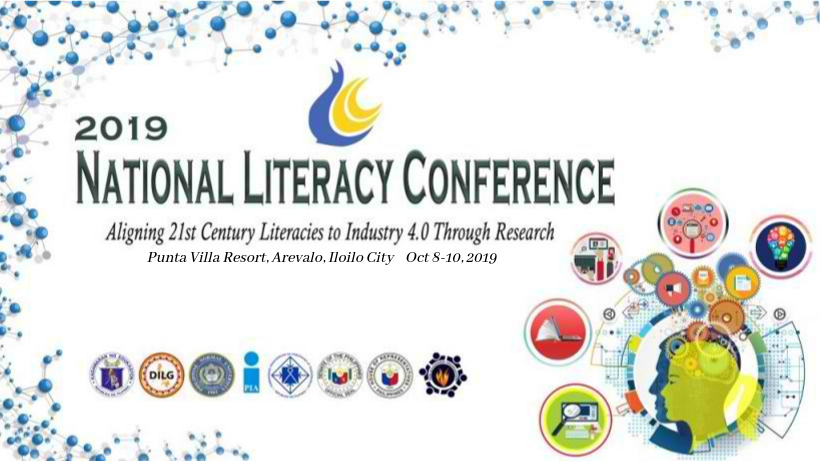
Day 1
(Plenary Session I) Industry 4.0_Prospects and Challenges on Literacy by Dr. Alfredo E. Pascual
(Plenary Session II) The Literacy Research Agenda by Sherlyne A. Almonte-Acosta, Ph.D
Day 2
Synthesis on Policy Recommendations by Nemesio O. Malatamban III
Day 2 – Researches
04) The Extent of Bullying to Alternative Learning System (ALS) Learners by Florena M. Deuna, Ph.D.
07) Workplace Literacy Among In-Service Teachers by Maria Azela Lopez-Tamayo, Ph.D.
09) Financial Capability of Public School Teachers in the Philippines by Jerick C. Ferrer
National Literacy Conference
In celebration of the annual Literacy Week as stipulated in Presidential Proclamation No. 239 entitled Declaring the Period from September 2 to 8 of Every Year as Literacy Week, the Department of Education (DepEd), through the Literacy Coordinating Council (LCC), in cooperation and coordination with other government organizations (GOs), local government units (LGUs), private organizations (POs) and nongovernment organizations (NGOs), will hold the 2019 National Literacy Conference with the theme “Aligning 21st Century Literacies to Industry 4.0 Through Research,” from October 8-10, 2019 in Arevalo, Iloilo City.
The Conference aims to:
a. enhance education leaders and workers’ knowledge on the 21st Century Literacies, Industry 4.0 and research on literacy;
b. present research studies on the 21st Century Literacies;
c. appreciate stakeholders’ participation in literacy governance;
d. gather policy recommendations relevant to the literacy research agenda; and
e. provide a platform for the exchange of experiences and good practices on literacy implementation.
Participants of this conference are:
Agency or Organization | Expected Participants | No. of Participants |
DepEd | Regional Directors or Assistant Regional Directors | 17 (one per region) |
Regional NLA Coordinators or Regional ALS Focal Persons | 17 (one per region) | |
Schools Division Superintendents or Assistant Schools Division | 34 (two per region) | |
Division Supervisors of ALS and Formal Education | 34 (two per region) | |
Education Program Specialist for ALS (EPSA) | 34 (two per region) | |
Full-time District ALS Coordinators | 34 (two per region) | |
ALS Mobile Teachers | 68 (four per region) | |
DILG | LGU Officials (Mayor or Vice Mayor) actively implementing literacy programs | 51 (three per region) |
Barangay Chairperson actively involved in the universalization of literacy | 34 (two per region) | |
Other Government and Non-Government Organizations | Society Organizations (CSOs) including NGOs involved in literacy implementation | 34 (two per region) |
Heads and members of partner academic institutions | 17 (one per region) | |
Researchers from Public and Private Higher Education Institutions | 68 (four per region) | |
| Total | 442 Participants (26 participants per region) |
BULLETIN BOARD
Day 2: LCC Call for Papers
To officially begin the second day of the event, Jaro National High School Singing Trio entertained the participants with a …Read More »Day 1: LCC Awarding of Hall of Fame for Outstanding Literacy Program and Plenary Sessions I to V
This October 9, the 2019 National Literacy Conference with the theme, “Aligning 21st Century Literacies to Industry 4.0 through Research,” …Read More »Day 0: Billeting and Research Poster Exhibit
The Department of Education (DepEd), through the Literacy Coordinating Council (LCC), is currently conducting the 2019 National Literacy Conference as …Read More »About the 2019 National Literacy Conference
National Literacy Conference In celebration of the annual Literacy Week as stipulated in Presidential Proclamation No. 239 entitled Declaring the …Read More »